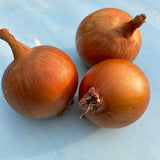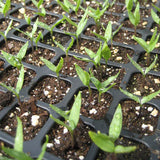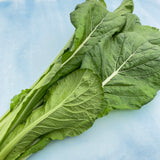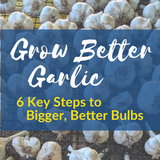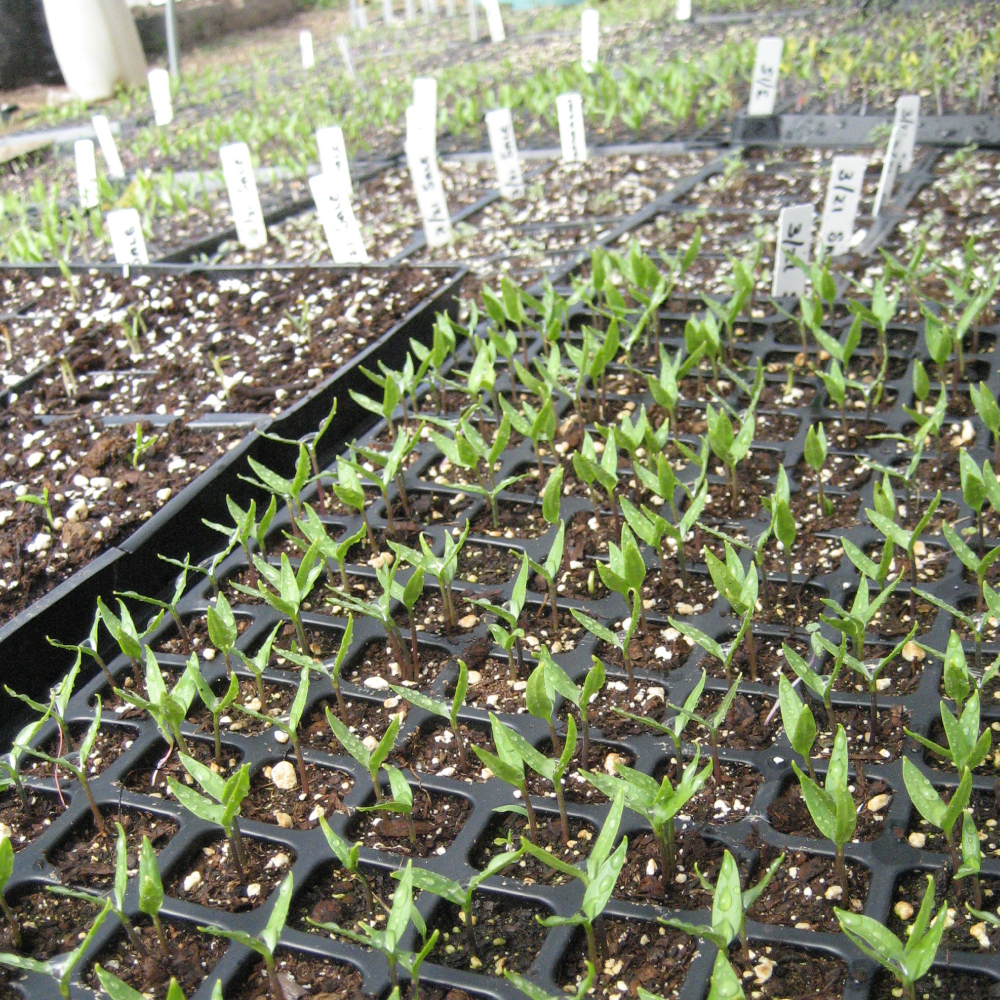
Making Peppers Pop and Eggplants Emerge
 Many gardeners have known the disappointment of a tray of sown pepper or eggplant seeds just sitting there, and sitting there, and sitting there—above the refrigerator or on a window sill, or tucked into a grow-light setup, or in a cold frame. Whispering sweet encouraging words seems to do nothing to coax the life out of the little vessels; they just won't budge. Getting peppers to pop and eggplants to emerge requires two things in abudance: moisture and heat. In a typical house in a northern March, it's easy enough to provide the moisture. The heat? That's a different story. In my experience, it's virtually impossible to get pepper or eggplant seeds to pop quickly without some source of steady heat. Seeds of both crops germinate best at temperatures of 80-85 degrees; when held at this range and given plenty of moisture, eggplants will typically pop within 4-5 days, with peppers following, in the 5-7 day range.
Many gardeners have known the disappointment of a tray of sown pepper or eggplant seeds just sitting there, and sitting there, and sitting there—above the refrigerator or on a window sill, or tucked into a grow-light setup, or in a cold frame. Whispering sweet encouraging words seems to do nothing to coax the life out of the little vessels; they just won't budge. Getting peppers to pop and eggplants to emerge requires two things in abudance: moisture and heat. In a typical house in a northern March, it's easy enough to provide the moisture. The heat? That's a different story. In my experience, it's virtually impossible to get pepper or eggplant seeds to pop quickly without some source of steady heat. Seeds of both crops germinate best at temperatures of 80-85 degrees; when held at this range and given plenty of moisture, eggplants will typically pop within 4-5 days, with peppers following, in the 5-7 day range.
Some Like It Hot How to achieve these temperatures without turning your home into a tropical paradise? There are a couple good options: One easy way to get a warm spot is to turn the light on in the oven with the door shut. Put a thermometer in there to see where the temperature lands after an hour or two of steady light. Newer ovens are less likely to generate enough heat, because the bulbs in them have become more energy efficient. If the temperature range looks appropriate, this can be a good spot to start your peppers and eggplants—just by all means be sure not to preheat the oven with your trays in there! Not only will it kill the germinating seeds, it will also probably melt your plastic trays all over your oven. Put a warning sign on the outside and by the knob if you share the oven with anyone who might not remember what's cookin'. For many years, seed starters took advantage of the heat emitted by their refrigerators to achieve a warm spot. But refrigerators have become dramatically more efficient over the past twenty years, so they cycle less frequently and thus give off much less heat. Most fridge tops are now no warmer than any other spot in the kitchen. But if you're still using an old energy guzzler, you might as well take advantage of the waste heat—permaculture can happen even in the kitchen! Do you run a wood stove in your house? Setting up a seed-starting spot close to it can be a great way to make peppers pop—just be sure to monitor the temperature at soil level to be sure you're not baking the seeds or subjecting them to cool drafts. Wood stoves create air cycles around them; often just below a wood stove it can be quite cool, so be sure not to attempt seed starting at ground level. The ideal arrangement is to purchase some grow mats or construct a germination chamber. With either of these solutions you are able to precisely regulate the soil temperature for optimal germination. You'll be amazed at the speed and uniformity at which these usually slow-to-germinate varieties emerge when their temperature is precisely controlled.
Progress Not Perfection Even if you fall short of the 80-85 degree target, rest assured: your seeds will still pop, they'll just take more time. So if you know in advance that you will be unable to finagle a suitable set-up, start your pepper and eggplant seeds 2 weeks earlier than you otherwise would and oversow: the germ rate will be lower when held at cooler temperatures. That said, do not attempt to germinate peppers or eggplants in a location that is cooler than room temperature, such as a basement. When exposed to prolonged temperatures below 60-65 degrees, the seeds are prone to rot and will never emerge.
Thwart the Thieves! One other tip related specifically to pepper germination: do not attempt to start pepper seeds anywhere you know you have a rodent problem. Mice and voles will smell the delectable peppery scent of these seeds as soon as you sow them and will rip through your trays to feast on them. If you have no choice but to start them somewhere where they are at risk, construct a small cage out of hardware cloth to keep rodents at bay.

